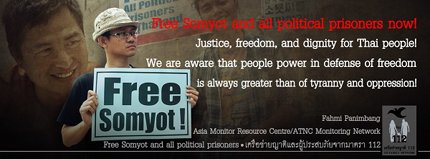
Court hearing Somyot 19th December: an update
Somyot, a Thai labour activist, human rights defender and magazine editor, has been in detention since April 2011, awaiting trial under the Thai lèse-majesté law* (Article 112) for the publication of two articles deemed insulting to the monarch. He faces up to 30 years in prison.
Last month, we visited Somyot in prison and talked with him about his prison life, the books he likes reading and the souvenirs of plastic replica's of prison food visitors can buy.
Somyot’s court hearing was postponed at the last minute to 19 December when the court decided that they needed to wait for the constitutional court to make a judgment regarding the constitutionality of Article 112 (the lèse-majesté law), under which Somyot is being held. Disappointingly for Somyot’s supporters, on 10 October 2012, the Constitutional Court ruled unanimously agreed that Article 112 was not in contradiction with the Constitution…
“The deprivation of liberty of Mr Prueksakasemsuk (…) is arbitrary”, UN Working Group on Arbitrary Detention.
At its meeting in late August 2012, the UN’s Working Group on Arbitrary Detention delivered its opinion saying that “the deprivation of liberty of Mr Prueksakasemsuk (…) is arbitrary”. The Working Group requested the Government to take the necessary steps to remedy the situation and bring it into conformity with the standards and principles set forth in the International Covenant on Civil and Political rights. The Working Group said that the adequate remedy would be to release Somyot and give him an enforceable right to compensation. Although this is good news for Somyot and all others charged and detained under article 112, it is doubtful that this Opinion will be followed by the government.
At the governmental level, Somyot’s wife met with EU representatives and UN Office of the High Commissioner for Human Rights. A number of human rights organisations have urged European country governments to continue to pressure the Thai government regarding lèse majesté cases and the foreign ministers of Italy, Switzerland and the EU have stated that they are following the case and will continue to raise the issue with the Thai government. The EU said it will plan a prison visit to Somyot and have raised the case of Somyot in recent official talks with Thailand's Foreign Ministry. The EU has also encouraged the Royal Thai Government to invite Frank La Rue, UN Special Rapporteur for Freedom of Expression to Thailand.
The public have also been showing their support. More than 8,000 people signed the petition to the Prime Minister of Thailand for Somyot’s release. The petition was submitted by the Thai Labour Campaign and other organisations during an action in Bangkok on 19 September. On the same day CCC, Amnesty International, Civil Rights Defenders, Freedom House, FIDH and OBS issued a media statement to again draw attention to his case.
Action is still needed to support the Free Somyot campaign.
For more information about Somyot and his case:
* Thailand’s lèse-majesté law prohibits any word or act, which “defames, insults, or threatens the King, the Queen, the Heir-apparent, or the Regent”. This law places the country in contravention of its international legal obligations to uphold international standards of freedom of expression.